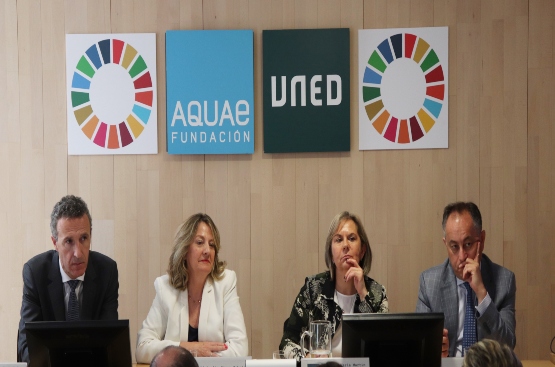A pilot study carried out at the UNED center in Calatayud will help other universities reduce their water and energy consumption

The Water Economy Chair Aquae, the result of collaboration between the Aquae Foundation, the foundation of Aquara, a company that manages the municipal water service of Calatayud and the National University of Distance Education (UNED), has presented the study 'Achievement of the SDGs in the UNED and its associated centers through the reduction of water and energy consumption.
The objective of this study is to establish an environmental performance protocol that will help the rest of the university centers measure and analyze their water and energy consumption in order to make more efficient use of these resources, thus achieving six of the 17 Sustainable Development Goals ( ODS).
This environmental protocol is based on the pilot study carried out during the years 2017 and 2018 at the associated center of the UNED in Calatayud, where the water and energy consumed by its users have been quantified, as well as the emissions of CO2 associated with these consumptions. This study has also involved six other associated centers of the UNED (Madrid, Valencia, Pontevedra, Cartagena, Segovia and Tortosa), which in total add up to 10 buildings. A methodology that sets the basis for its application in other universities in our country, where there are currently 86 university centers (public and private), which have more than 340 buildings.
According to Amelia Pérez Zabaleta, director of the Aquae Chair of Water Economics, "the improvement of efficiency in universities can have a great environmental impact, taking into account that most of these centers have a considerable size and in which In addition, there is a very high concentration of water and energy consumption ".
The results of this study reveal that the consumption of water and energy (and the associated CO2 emissions) of the centers analyzed is at levels well below other university centers analyzed in previous research. In the centers of the UNED, the average water consumption per person per day was 0.72 liters in 2017 and 0.81 liters in 2018, a consumption much lower than the 43.5 liters consumed per person per day in the schools (2011 study) or 26.8 liters registered in universities (2014 study).
The foundation of Aquara, Aquae Foundation, which created the Aquae Chair of Water Economics together with the UNED in 2013, works to achieve the 17 Sustainable Development Goals, 11 of which it is already achieving thanks to this and other projects such as' Water for the Peruvian Amazon '(ODS 3: Health and Welfare) or' Sowing Oxygen '(ODS 13: Action for Climate).
Measures to achieve the SDGs reduce water consumption
This report also shows that the four buildings that have implemented measures to achieve the ODS in water (faucets with lower water consumption and double flush toilets) make a more efficient use of this resource than the other six centers analyzed since they have average requirements of 0.64 m3 / person / day, while those that have not carried out any measurements consume an average of 0.85 m3 / person / day.
During the Seminar 'Water Economy and ODS in the UNED', where yesterday this environmental protocol was presented, the four phases of this research have been described.
The medium-term objective of this project is to continue collecting consumption data in the rest of the associated centers of the UNED and extend the period analyzed. Two other possible extensions of this study go on to calculate the complete carbon footprint (not only the one directly linked to the consumption of water and energy); and evaluate waste management such as plastic in these centers.